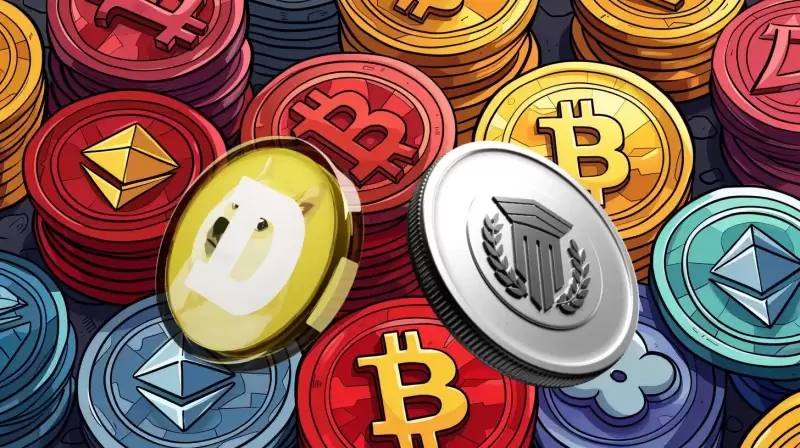 |
|
 |
|
 |
|
 |
|
 |
|
 |
|
 |
|
 |
|
 |
|
 |
|
 |
|
 |
|
 |
|
 |
|
 |
|
Cryptocurrency News Articles
Ripple's Growing Influence in the Financial Sector: Excitement and Skepticism
Nov 15, 2024 at 11:36 pm
Ripple's technology offers a vital conduit for financial inclusion in emerging economies. However, its widespread adoption isn't without its hurdles.

As Ripple continues to make waves in the financial world, several key developments and implications have gone largely unnoticed. These points offer a deeper understanding of how this innovative platform may impact people and economies around the globe.
Strategic Alliances and Market Expansion
Ripple's recent strategic partnerships with major financial institutions in Latin America could significantly alter the region's financial landscape. By integrating with existing banking networks, Ripple may facilitate smoother, faster cross-border transactions, addressing long-standing inefficiencies in remittances, which millions of people in the region rely on. This has the potential to stimulate local economies by maximizing the capital that enters through foreign remittances, directly improving living standards and opportunities for many families.
Technological Innovations
On the technological front, Ripple is expanding its services beyond mere transactions. By developing smart contracts and decentralized finance (DeFi) applications, Ripple could play a crucial role in diversifying the financial tools available to underserved communities. This development may democratize access to advanced financial services, which are typically dominated by larger entities, and could aid in the cultivation of entrepreneurial ventures that rely on DeFi.
Security and Environmental Impacts
However, as Ripple expands its technological capabilities, important questions arise regarding security and environmental sustainability. How secure are these smart contracts? Can Ripple maintain the integrity and security of its network as it scales? Additionally, as more transactions are processed on the blockchain, concerns mount over the energy consumption associated with maintaining these systems. While Ripple claims to be more energy-efficient than its competitors, further scrutiny and advancements are needed.
Centralization Versus Decentralization
A prominent point of contention surrounding Ripple is its centralized nature. With the majority of XRP tokens controlled by Ripple Labs, questions arise about decentralization. How does this influence Ripple's ethos and its appeal to blockchain enthusiasts who prioritize decentralization? A centralized system arguably offers more stability and predictability, which can be advantageous for large-scale institutions wary of volatility. However, it might deter users who view decentralization as a safeguard against centralized control and potential market manipulation.
Impacts on Financial Ecosystems
Ripple's active role in assisting central banks with Central Bank Digital Currencies (CBDCs) has ripple effects that extend beyond corporate profits. By supporting CBDCs, Ripple can create a smoother bridge between traditional fiat currencies and digital finance, potentially revolutionizing government monetary policies and improving transaction transparency. However, such changes could also disrupt existing financial ecosystems and alter how governments regulate and monitor currency flow.
For further insights into Ripple’s groundbreaking innovations and their potential implications, explore Ripple.
In projecting Ripple's future, several critical questions emerge: How will Ripple’s increasing influence shape financial systems in developing countries? Will the integration of digital currencies dilute traditional banking power, or could it enhance stability in regions prone to economic fluctuations?
The answers to these questions could dictate whether Ripple becomes a harbinger of global financial reform or confronts a wave of challenges that stall its progress.
For further insights into Ripple’s groundbreaking innovations and their potential implications, explore Ripple.
By understanding these underreported dimensions, stakeholders can better grasp Ripple’s potential to influence global financial systems, impacting billions of people in the process. The unfolding story of Ripple remains not just a saga of technological evolution, but also one that could redefine global economic borders.
Disclaimer:info@kdj.com
The information provided is not trading advice. kdj.com does not assume any responsibility for any investments made based on the information provided in this article. Cryptocurrencies are highly volatile and it is highly recommended that you invest with caution after thorough research!
If you believe that the content used on this website infringes your copyright, please contact us immediately (info@kdj.com) and we will delete it promptly.
-

-

- “Silver will slingshot to all-time new highs”—Rich Dad Poor Dad author Robert Kiyosaki says silver is currently more valuable than gold or bitcoin.
- Apr 03, 2025 at 11:45 am
- Robert Kiyosaki, author of the best-selling book Rich Dad Poor Dad, has weighed in with a strong endorsement for silver, calling it the hottest investment of today.
-

-

- XRP Price Prediction: Will the Current Trading Environment for XRP Reflect Consolidation Within a Cautious Downtrend?
- Apr 03, 2025 at 11:40 am
- The current trading environment for XRP reflects consolidation within a cautious downtrend, with prices anchored at $2.12 to $2.135 amid a 24-hour trading range of $2.07 to $2.19
-

-

-

-

-






























































